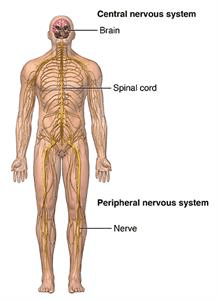Conditions
Medical Conditions We Treat ..
Joints & Bones
Frozen Shoulder (Adhesive Capsulitis)
Neck & Spine
Degenerative Disc Disease(DDD)
Herniated Discs(Bulging Discs)/Slipped Disc
Muscles
Multiple sclerosis
Multiple sclerosis (MS) is a long-lasting (chronic) disease of the central nervous system. It is thought to be an autoimmune disorder, a condition in which the body attacks itself by mistake. MS is an unpredictable disease that affects people differently. Some people with MS may have only mild symptoms. Others may lose their ability to see clearly, write, speak, or walk when communication between the brain and other parts of the body becomes disrupted.

Causes
There are many possible causes of MS, including:
- Autoimmune disorders
- Infectious agents, such as viruses
- Environmental factors
- Genetic factors
Symptoms
The symptoms of MS are often unpredictable. They may be mild or severe, short-term or long-lasting. They may appear in different combinations, depending on the area of the nervous system affected. The following are the most common symptoms of MS. But each person may have different symptoms.
First symptoms of MS
The following are often the first symptoms of MS:
- Blurred or double vision
- Red-green color distortion
- Pain and loss of vision because of swelling of the optic nerve (optic neuritis)
- Trouble walking
- An abnormal feeling or pain, such as numbness, prickling, or pins and needles (paresthesia)
Other symptoms of multiple sclerosis
- Muscle weakness in the arms and legs
- Trouble with coordination. You may have problems walking or standing. You may also be partially or completely paralyzed.
- The involuntary increased tone of muscles leading to stiffness and spasms.
- This may be brought on by physical activity, but it may ease with rest. You may have constant tiredness that doesn’t go away.
- Loss of sensation
- Speech problems
- Tremor
- Dizziness
- Hearing loss
- Bowel and bladder problems
- Depression
- Changes in sexual function
- About 50% of all people with MS have thinking (cognitive) problems linked to the disease. The effects of these problems may be mild. Your healthcare provider may only find them after much testing. The problems may be with:
- Focusing (concentration)
- Attention
- Memory
- Poor judgment
Diagnosis
An MS evaluation involves a complete health history and neurological exam. This includes:
- Mental functions
- Emotional functions
- Language functions
- Movement and coordination
- Vision
- Balance
- Functions of the 5 senses
The following may be used when evaluating a person for multiple sclerosis:
MRI. A diagnostic test that uses a combination of large magnets, sound waves, and a computer to make detailed pictures of organs and structures within the body. It can find plaques or scarring caused by MS.
Evoked potentials. These tests record the brain’s electrical response to visual, auditory, and sensory stimuli. These tests show if you have a slowing of messages in the different parts of the brain.
Cerebral spinal fluid analysis. This is also called a spinal tap or lumbar puncture. It looks at the fluid taken from the spinal column to make an evaluation or diagnosis. This test checks for cellular and chemical abnormalities seen with MS.
Blood tests. These are done to rule out other causes for various neurological symptoms.
Evaluation and diagnosis of MS requires a variety of tools to rule out other possible disorders. It also requires a series of lab tests that, if positive, confirms the diagnosis.
